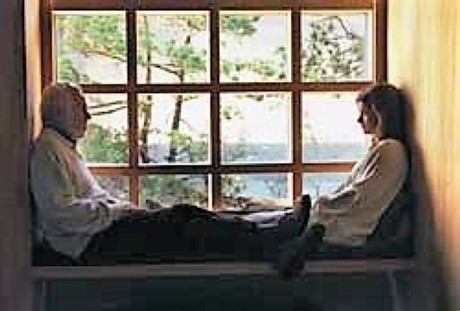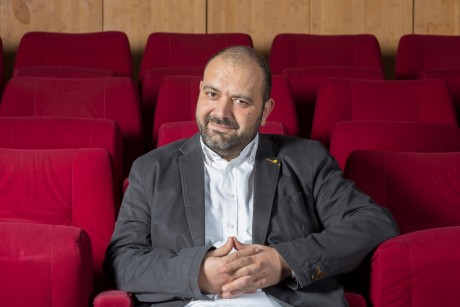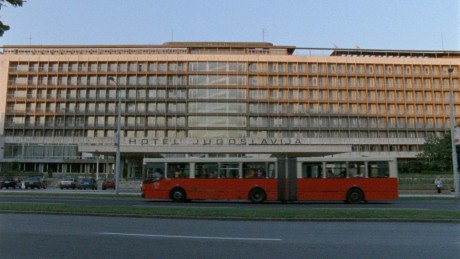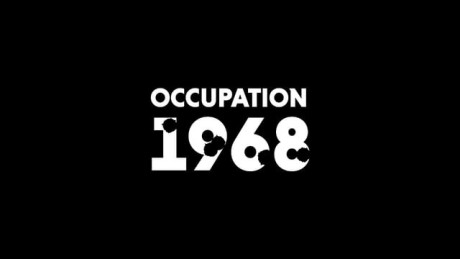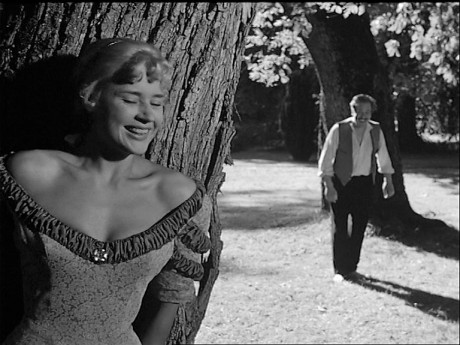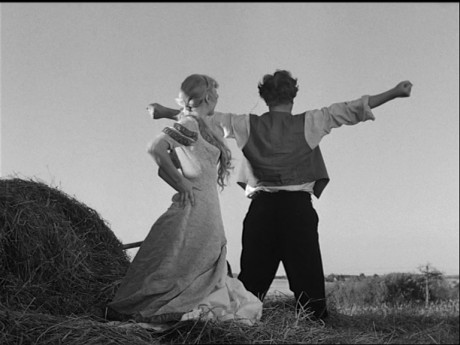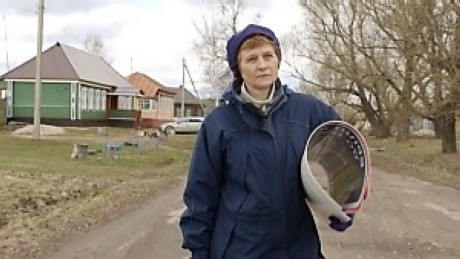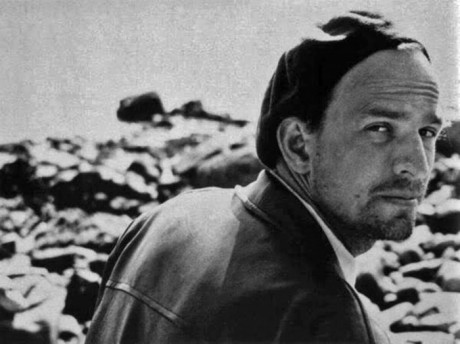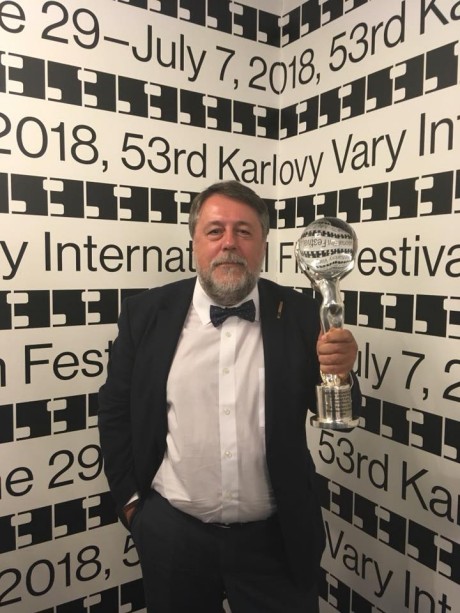Jeg sidder ved skrivebordet, der står midt i værelset. En rødbrun soldatertæge kravler tøvende op over bordkanten. Der står helt afgørende nogen bag min ryg, selv om døren hverken er blevet åbnet eller lukket. Der står altså nogen bag min ryg…
SKRIVEBORD
Det handler om manden i huset ved havet, og sådan begynder Bergmans manuskript til filmen om lige netop den mand:
”Første akt nr. 1. Mit navn er Andreas Winkelman. Jeg er otteogfyrre år. Jeg husker at det var en trykkende oktoberdag. Jeg sad på taget af mit medtagne hus og reparerede på bedste beskub. Efter den sidste omgang regn var det begyndt at lække for alvor. Da jeg så op fra mit arbejde stod der tre sole over havet. Ikke en vind rørte sig, alt var fuldkommen lydløst. Jeg tændte min pibe, sad længe og betragtede fænomenet. Så trak en mørk sky op vestfra og gik for solene. Det begyndte endelig at blæse. Eftermiddagen skumrede. En hund gøede. Fårene bevægede sig gravitetisk over heden. Nede på vejen kørte Daniel med et læs halm, hans gamle hest gik i luntetrav. Jeg steg ned fra mit ophøjede stade og gik ind i køkkenet for at lave kaffe. Radioavisen fortalte om forskellige mislykkede foretagender. Derimod nævnede den ikke noget om mine tre sole. Omtrent en time senere så jeg dem for første gang. De fulgte vejen langs havet. En mand og to kvinder…” (En Passion, 1968)
Teksten fastholder og gentager med fuld billeddannelse og lydetablering denne erfaring om den resignerende mand, som forsvarer sin ensomhed der på fåreøen og venter på kærligheden. De få linjer i dette anslag har siden, jeg læste dem første gang – det var før jeg så filmen – været aldeles centrale for mig, min opfattelse af at være mand og af mandens ambition: ensomheden, kysten, havet, stilheden, enkelheden – jeg stiger ned og går ind i køkkenet for at lave kaffe – og så mødet… Senere da jeg så filmen, var manuskriptets tekst og scenen naturligvis fuldstændig kongruente. Filmen var for så vidt færdig i dens manuskripts formulering. Og teksten fastholder filmens erfaring, og den har næsten mere end filmen haft enorm betydning for mig, når jeg har skullet leve mit eget liv opmærksomt.
Hos Ingmar Bergman er det muligt for mig at forfølge disse temaer, som jeg bilder mig ind er mine, finde scenerne frem, som jeg også bilder mig ind, jeg er alene med. For eksempel – jeg bladrer i hans bøger – skrivebordet i huset ved havet. Her samles alt. Det bord er hans mindste scene. Lidt større scener er dukketeateret i Fanny og Alexander, havehuset i Som i et Spejl, stuen, hjemmet… De medvirkende er børnene og forældrene og slægtningene. Manden og kvinden. Elskeren og elskerinden. De elskende… Ind imellem er der flere personer i huset ved havet:
”Huset står ensomt på den lange sandodde og er tydeligt mærket af den udsatte beliggenhed. Det er i to etager og mørkegrønt de steder, hvor sol og blæst ikke har slidt malingen af og fået en lysere silketone til at træde frem i træet. Bagsiden vender ud mod en stor tilgroet have, som delvis ligger skjult bag et højt plankeværk. Huset er beboet. Vasketøj flagrer fra en tørresnor, og vinduerne står åbne under halvt sønderblæste markiser. Råb og latter stiger op fra det brusende, aftenmørke hav. Pludselig vipper fire hoveder på bølgerne, og snart begynder fire mennesker at vade ind over den lange, flade forstrand. De er forpustede som efter en hård svømmetur og ler udmattet; de går ved siden af hinanden og tegner sig som fire sorte figurer mod solnedgangen og vandspejlingernes urolige flammer. To mænd, en dreng og en kvinde.” (Som i et spejl, 1960)
Det er faderen, Gunnar Björnstrand, datteren Harriet Andersson, sønnen Lars Passgård og svigersønnen Max von Sydov. Faderen er forfatter, datteren er skizofren, sønnen beundrer sin far, men føler sig afvist og er sin søster hengiven, svigersønnen er læge. Skrivebordets scene, det er sent på sommernatten, faderen er alene. Det lyder sådan i manuskriptet:
”David (læser): Hun kom imod ham dirrende af forventning, blussende rød af den skarpe blæst… (sukker): Herregud, herregud.
Han skubber brillerne op i panden og skjuler sit grå ansigt i hænderne. Lidt efter går han atter i gang med arbejdet.
David (læser): Hun kom imod ham dirrende af forventning…
Så streger han resten af sætningen over med en tynd streg, betragter sit værk. Så streger han det hele ud.
David: Hun kom løbende imod ham med ansigtet blussende af den skarpe blæst…
Han ryster på hovedet og bøjer sig over papiret, prenter følgende med rødt blæk: Hun kom løbende imod ham. Så sukker han og ryster på hovedet, streger det ud med en tyk streg og skriver resolut: De mødtes på stranden.” (Som i et spejl, 1960)
Det handler om ham og hende, resten ved vi godt, når handlingen er et møde og stedet er stranden.
Bergman skriver: ”I dag forstår jeg, at jeg i Persona – og senere i Hvisken og råb – er kommet så langt, som jeg kan komme. Så langt, at jeg i frihed berører ordløse hemmeligheder, som alene cinematografien kan løfte frem til os…” (Billeder, 1990)
To kvinder, sygeplejersken Bibi Andersson og skuespillerinden Liv Ullmann bor for en tid i huset ved havet. Det nordiske sommerhus, som bliver til huset på Fårø.
”Det ligger afsides med en langstrakt kyststrimmel ud mod det åbne hav mod nord og en bugt med stejle klipper mod vest. Bag huset strækker en lynghede og et skovområde sig. Fru Vogler (Ullmann) har godt af opholdet ved havet. Den apati, der har lammet hende, mens hun lå på hospitalet, begynder at vige for lange spadsereture og fisketure, madlavning, brevskrivning og…”(Persona, 1966)
Brevet, ja det afgørende brev bliver til ved bordet foran vinduet, det er Liv Ullmann, som skriver. Ude i regnen ved Volvoen ser vi Bibi Andersson. Hun skal om lidt læse det brev, som ikke er til hende, men handler om hende. Som Harriet Andersson i Som i et spejl læser faderens tilsvarende notat i dagbogen. Som handler om hende, men jo ikke er beregnet for hende. På handlingsplanet. Havet og kysten, ja, det sted er eksistensgenererende, det erotiske højdepunkt er ved havet. Men det eksiterer alene i Bibi Anderssons fortælling som foregår i huset, i Bergmans manuskript. Men jeg ser stranden. De store opgør mellem de to er en lang travelling langs kysten. Brevet og dagbogen, forfatterens værktøj, afdækker krisen og tabet, kunstens utroværdighed. Sygeplejerskens uskyld. Fortrolighedens forræderi.
Det må så blive manden selv, som alene i huset ved havet ved skrivebordet i arbejdsværelsen tager et sidste opgør med sig selv. Det er i Troløs, som Liv Ullmann instruerer på Bergmans manuskript. Bordet står midt på gulvet. Bag det reoler med bøger og plader, tekster og musik og den indbyggede bænk i nichen med det store vindue med havet lige udenfor. Igen bordet midt på gulvet, hvor manuskript efter manuskript er blevet afsluttet med ”Fårö…” og så datoen. Som gør, at jeg fornemmer vejret den dag, han var færdig. Jeg så ivrigt efter i Marie Nyreröds dokumentarserie, som SVT sendte for et par år siden. Som nu disse måneder genudsendes. Jo, det var og er intakt, det rum. Det er en fast kulisse. Filmenes billeder står alvorlige og rolige omkring teksterne herfra. Vi ser huset og havet. Personerne kommer ind på scenen. I begyndelsen er bænken ved vinduet tom. Bergman begynder manuskriptet sådan:
”En mild forsommerdag. Vinduet står åbent. Havet og fyrretræerne bruser. Jeg sidder ved skrivebordet, der står midt i værelset. En rødbrun soldatertæge kravler tøvende op over bordkanten. Der står helt afgørende nogen bag min ryg, selv om døren hverken er blevet åbnet eller lukket. Der står altså nogen bag min ryg, men det er ikke Døden…” (Troløs, 2000)
Det er kvinden, skuespillerinden, som endnu en gang dukker op der i erindringsarbejdet, i selvangivelsen før døden. Han havde tilsagt hende, men glemt det. Lena Endre er kvinden, Erland Josephson er manden ved skrivebordet. Hun sætter sig på bænken i vinduesnichen. De taler om manden og kvinden. Udenfor er havet. Kort efter sætter han sig på bænken, så han sidder over for hende. Her får vi så fortællingen om, at de dengang tog til Thielska Galleriet, og de sad der i en krog og talte, især han, og så kom tavsheden og dette tomme sekund og det første kys mellem de elskende troløse…
